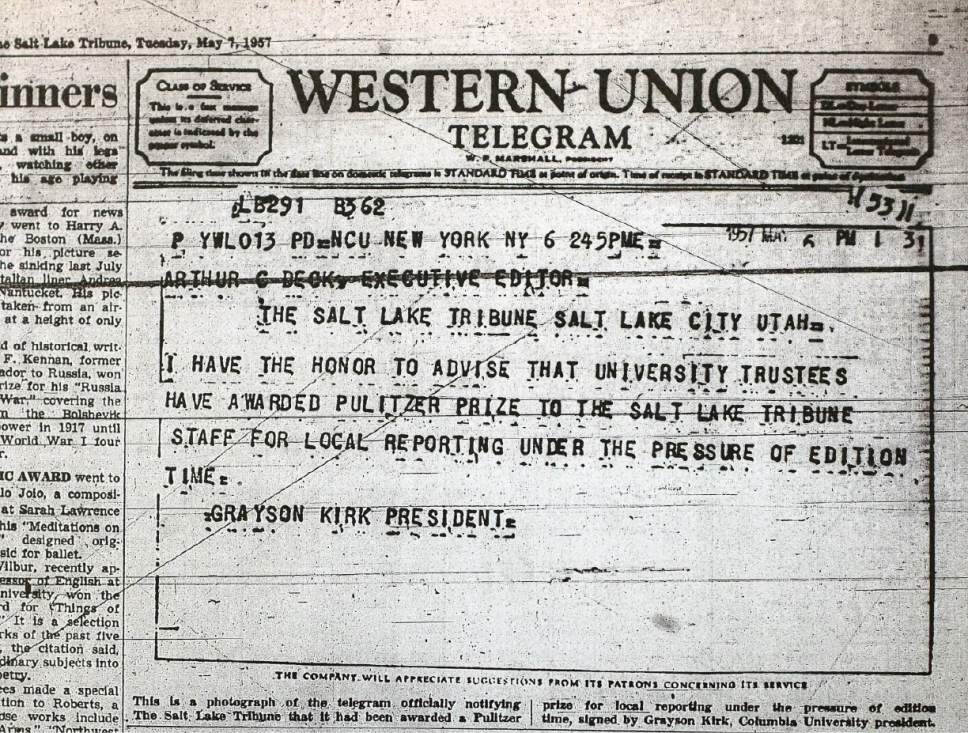This is an archived article that was published on sltrib.com in 2017, and information in the article may be outdated. It is provided only for personal research purposes and may not be reprinted.
Editor's note • Every Saturday, Salt Lake Tribune columnist Robert Kirby digs into the state's past to enlighten or, at least, entertain Utahns in the present. Have a story to share? Visit Facebook.com/DisturbingHistory, or email rkirby@sltrib.com.
When I arrived Tuesday morning at The Salt Lake Tribune, the newsroom bore all the signs of a celebratory riot the night before — party hats, confetti, empty bottles, desks knocked askew, and a sports writer still passed out in the bathroom.
I wasn't about to complain. Not after the announcement Monday that we had won a Pulitzer Prize for local reporting on sexual assaults at Brigham Young University and other Utah campuses.
A Pulitzer is a big deal. It's also a hard act to follow. Proof is that we haven't won a Pulitzer since our first one in 1957. The award that time was for our stellar reporting on an air disaster that occurred over the Grand Canyon, killing 128 people.
I have no memory of that Pulitzer because I wasn't living in The Tribune's circulation area at the time. That, and I was only 4 years old. But I've since read up on it.
On June 30, 1956, two airliners occupied the same piece of sky over the canyon. At roughly 20,000 feet, the propeller of one plane buzz-sawed the tail section off the other.
The resulting violent decompression rained people, luggage, airplane parts, and complimentary beverages all over the desert near the confluence of the Colorado and Little Colorado rivers.
Fast-forward 60 years and our second Pulitzer is for the grim coverage of the manner in which colleges treat the victims of sexual assault.
Awards are nice as long as they're earned legitimately. In 1981, Washington Post writer Janet Cooke received a Pulitzer for her reporting on an 8-year-old heroin addict she referred to as "Jimmy."
It was great reporting, but for the fact that none of it was real, including Jimmy. Cooke had made him up. She eventually confessed, surrendered her Pulitzer and resigned.
You don't even have to make up stuff to get into Pulitzer trouble. Doubt has been cast on combat photographer Joseph Rosenthal, whose iconic photo of Marines raising the U.S. flag on Iwo Jima won him a Pulitzer.
Because other pictures Rosenthal took at the same time were staged, people asserted he did the same for the heroic photo as well. I don't think he did, but he never got out from under that shadow.
In 1931, New York Times journalist Walter Duranty wrote a series of articles extolling the virtues of Josef Stalin, blithely excusing the dictator's genocidal rampages as being a bit, sort of, and maybe even, uh, necessary.
The articles won Duranty both the Pulitzer and the title of "journalism's greatest liar." I didn't even know that last one was a category. Maybe there's hope for me yet.
But Utah has an even shadier past when it comes to Pulitzers. In 1903, William Hooper Young, grandson of Brigham Young, stabbed a young woman named Anna Pulitzer to death in a New York apartment while both of them were whacked on narcotics.
Hooper, as he was called, dumped his Pulitzer in a canal and tried to sneak off disguised as a bum. He was caught and spent 24 years in New York's Sing Sing prison. Paroled, he eventually managed to disappear as a real bum.
Finally, our esteemed rival, the Deseret News, won a Pulitzer through the investigative reporting of Robert D. Mullins, who went above and beyond in 1961 reporting on a murder and kidnapping at Dead Horse Point.
Ugly business, this Pulitzer stuff. I'm perfectly happy and willing to go the rest of my life without doing what it takes to score one.



